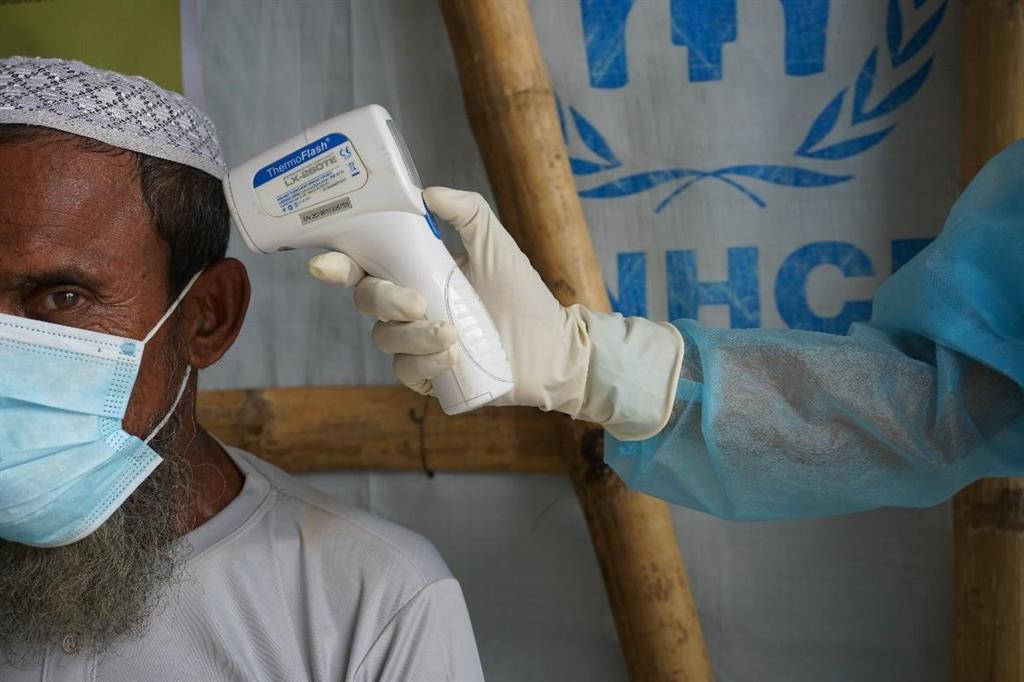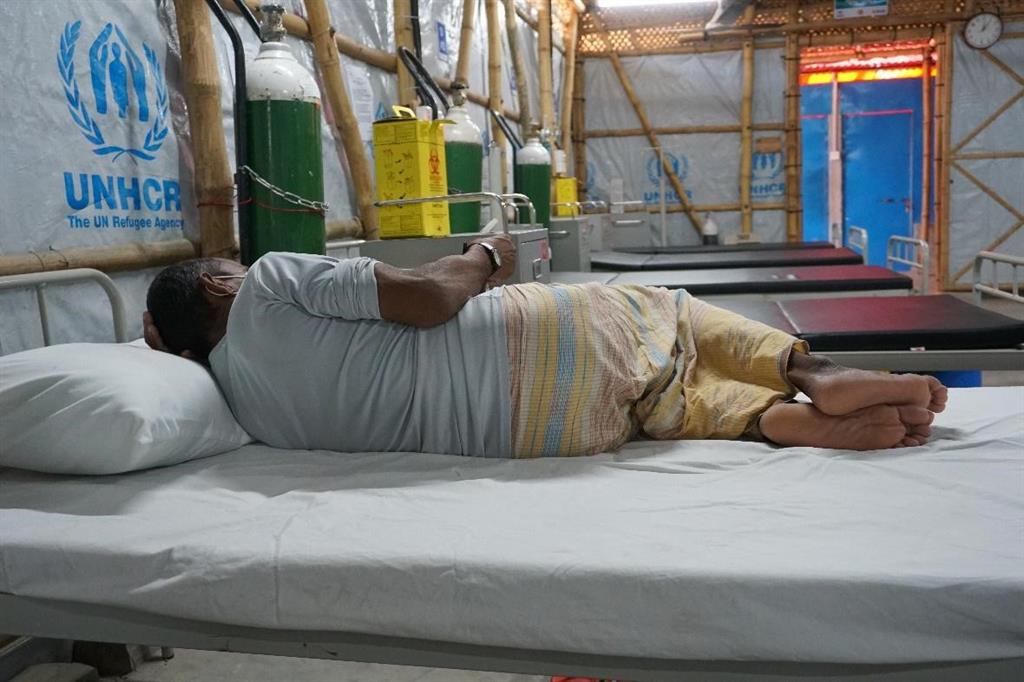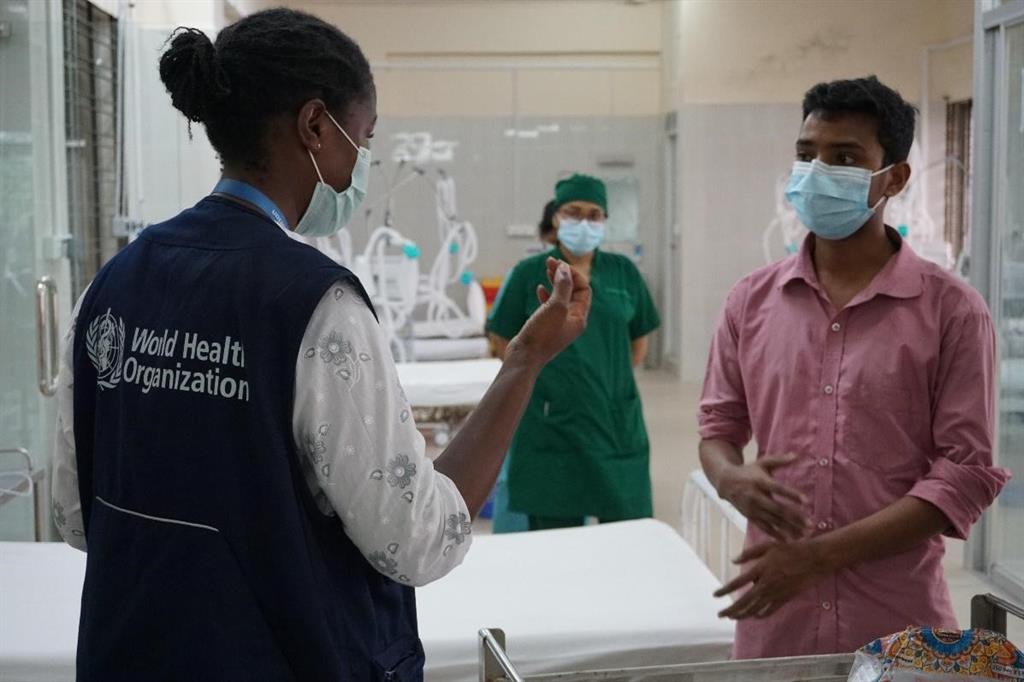
WHO is fostering peer to peer support and knowledge exchange on the full spectrum of the COVID-19 illness, from screening to rehabilitation, to optimize clinical health care in Cox’s Bazar. WHO Bangladesh/Tatiana Almeida
It has been six months since the humanitarian health care workers at the world largest refugee camp in Cox’s Bazar found themselves at arms with the coronavirus disease 2019 (COVID-19). The condition is caused by SARS-CoV-2, a newly emerged coronavirus, and reached the refugee camps on 14 May 2020 when the first Rohingya patient tested positive.
Since the onset of the outbreak, WHO is coordinating regular weekly specialist Operational, Clinical and Critical care online forums; each with a multidisciplinary panel of health care providers with experience in the clinical management of patients with COVID-19 and other viral infections to foster peer to peer support and knowledge exchange. With the guidance provided by WHO experts, the initiative is serving as a foundation for optimized clinical care to ensure the best possible chance for survival of patients in Cox’s Bazar.
“The aim of this forums is to ensure awareness and implementation of national protocols and WHO guidance on clinical case management of COVID-19 in SARI ITCs (Severe Acute Respiratory Infection Isolation Treatment Centers) in the refugee camps. Together, we revise referral pathways, contextualize case management guidelines, share clinical care experiences and challenges; identifying solutions and collaboratively working together with the specialist care network across the Camps to improve reporting, quality assurance and safe standards of care”, says WHO Case Management Coordinator, Bronte Martin.
“Today we bring the case of a severe COVID-19 patient and would like to hear your opinion and experience with similar cases”, starts Dr Aritra Das, Physician and infection prevention and control (IPC) focal point at Food for Hungry/UNHCR SARI ITC at Camp 5, in Ukhiya.
“A 28-year-old male with no history of asthma was referred to our health facility with breathing problems. After several days with cough, he mentioned that he could no longer tolerate the pain. He was immediately put in isolation and oxygen therapy. We also diagnosed him with diabetes and hypertension, health conditions he wasn’t aware of”, continues Dr Aritra.

A Rohingya patient with mild symptoms of COVID-19 at UNHCR/International Relief SARI ITC, in Ukhiya, Cox’s Bazar. WHO Bangladesh/Tatiana Almeida
While most patients with COVID-19 develop only mild or moderate symptoms, some develop severe disease that require oxygen support like the case described by Dr Aritra, and a lower number have critical disease with complications such as respiratory failure, acute respiratory distress syndrome (ARDS), sepsis and septic shock, thromboembolism, and/or multiorgan failure, including acute kidney injury and cardiac injury.
“During these meetings, frontline health care professionals working in SARI ITCs share their clinical case experiences. To support as mentor, an international Infectious Disease expert guides the audience to resolve different types of clinical challenges based on the recent scientific and evidence-based updates from around the globe”, explains Ina Bluemel, WHO Case Management Consultant.
The WHO Case Management team is coordinating access to a wide network of international experts. Since the inception of WHO’s weekly technical discussion, in July, over 40 meetings have collectively taken place across the forums. Each session has the duration of approximately 1 hour with representatives from different SARI ITC partners, local Bangladesh and UN Health Facilities alongside up to 15 international clinicians joining the discussions from three continents.
Outside the refugee camps, the Case Management team is also supporting the Intensive Care Unit (ICU) which was newly established with the support of the United Nations High Commissioner for Refugees (UNHCR), at the 250 Bed District Sadar Hospital, in Cox’s Bazar town. WHO brings together ICU clinicians, Doctors and nurses to link with remotely based ICU consultants and Specialist Nurses from around the globe to discuss current inpatient cases that the team is treating in their unit.
Since the opening of the newly formed ICU in July, virtual weekly critical COVID-19 case rounds have been presented with the Sadar ICU team presenting the case of a patient currently admitted for care in the ICU. Together with the multidisciplinary team of international experts, the latest emerging global clinical evidence is reviewed to support informed clinical decision making and treatment paradigms for that particular case.
Confronted with managing the most critically unwell affected by the pandemic day after day, takes both a physical and emotional toll, professional peer support and mentoring is also paramount in this context - supporting the frontline health care workers for who the burden is relentless.

Intensive Unit Care team at the 250 Bed District Sadar Hospital during one of the weekly virtual meetings organized and facilitated by WHO Cox’s Bazar Clinical Management Team. WHO Bangladesh/Tatiana Almeida
In addition, based on needs raised by the Hospital’s ICU team WHO organizes special ad hoc training sessions in collaboration with partners to facilitate continued development and establishment of ICU and Specialist services at the Hospital; such as Rehabilitation, Palliative care and advanced Oxygen Ventilation therapies.

WHO Infection Prevention and Control Specialist, Rebecca Rachel Apolot, talking with the IPC Focal point of 250 Bed District Sadar Hospital Intensive Care Unit before patients started being admitted. WHO Bangladesh/Tatiana Almeida
Infection prevention and control is a critical and integral part of clinical management of patients. In the months prior to the beginning of the COVID-19 response in Cox’s Bazar, WHO enhanced preparation for the pandemic through capacity building for health care workers. To date, training for Infection, Prevention and Control (IPC) has been provided to 3600 humanitarian health care workers and government staff from Severe Acute Respiratory Infection (SARI) ITC partners and government facilities.
In Cox’s Bazar and around the world, WHO is supporting national stakeholders to slow and stop the transmission of COVID-19, provide optimized care for all patients and minimize the impact of the epidemic on health systems, social services and economic activity.
